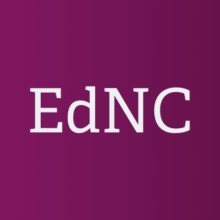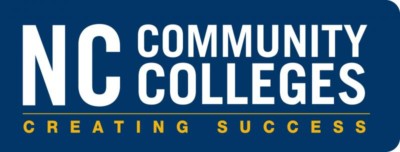The following is a press release from the NC State College of Education
The NC State College of Education and The Innovation Project have selected 19 N.C. High School Mathematics Master Teaching Fellows.
Supported by a five-year, $1.8 million grant from the National Science Foundation, this program will prepare, support and retain master teachers of mathematics from high-needs school districts across the state of North Carolina, and is a partnership between the NC State College of Education, The Innovation Project and seven school districts where the 19 fellows come from:
Cabarrus County Schools
-
Courtney Ballard
-
Jennifer Sutton
Hoke County Schools
-
Ellen Ross
Iredell-Statesville Schools
-
Ryne Cooper
Moore County Schools
-
Justin Blackburn
-
Julie Blue
-
Mathew Purser
Mount Airy City Schools
-
Bryan Hayes
-
Courtney Howlett
-
Cody Spicer
Rockingham County Schools
-
Leslie Baker
-
Ramona Bankston
-
Marion Buchheit
-
Elizabeth Richardson
-
Jodi Troxler
Wayne County Public Schools
-
Jamie Jones
-
Sheneka Lassiter
-
Joseph Otellio
-
Elvia Rodriguez Mejia
“We are excited about the opportunity to support these talented teachers,” said Ann McColl, CEO of The Innovation Project. “This program is an important part of a growing partnership with the NC State College of Education that allows us to creatively and effectively address a critical need in our partner school districts.”
During their five years in the program, the 19 Master Teaching Fellows will deepen their understanding of the mathematics they teach and effective mathematics teaching practices; gain experience leading and mentoring students and educators; and share what they learn with other educators across their district and the state and nation. Specific experiences will include:
-
Complete an online graduate certificate program in mathematics teaching and learning or a master’s program during the first year
-
Attend a week-long summer professional development institute each year
-
Work collaboratively to apply for National Board Certification
-
Complete an online mentor training program
-
Attend and present at mathematics teaching conferences
-
Receive technological tools and additional professional development and mentoring support
-
Assume leadership roles in their school or district
Once fellows complete requirements for a master’s degree, they will receive an annual salary stipend of $12,480 for up to five years.
“The goal of the program is to prepare high school mathematics teachers to be leaders and mentors in their schools and districts and within the state of North Carolina,” said Karen Hollebrands, Ph.D., Alumni Distinguished Undergraduate Professor at the NC State College of Education and principal investigator on the project. “An additional goal of the project is to retain highly qualified experienced mathematics teachers.”
###
About The Innovation Project: TIP is a nonprofit collaborative working group of 27 forward-thinking North Carolina district superintendents with a team of staff and collaborators. TIP grounds its work in objective evidence while acknowledging the need to thoughtfully consider and implement promising, pioneering practices. TIP projects emerge from rigorous analysis of research and national best practices, which inform superintendents’ engagement in iterative design processes. TIP’s work is driven by three overlapping themes: innovation, collaboration, and capacity building. These touchstones orient its approach to decision-making and guide project design.
About the NC State College of Education: The NC State College of Education is a research powerhouse grounded in its land-grant mission. The college is North Carolina’s largest supplier of STEM educators, consistently ranks as the top teacher preparation program in the state across multiple variables, and has established a leadership pipeline for schools, community colleges and higher education in North Carolina. The college enrolls over 1,500 undergraduate and graduate students, and its faculty currently engage in nearly 120 research projects funded through over $90 million in active research and development grants — the most of any college of education in North Carolina. The College of Education ranks among the top 12% in the U.S. News & World Report’s rankings and among the top 1% in the Times Higher Education’s World University Rankings.


